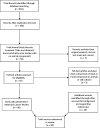Association between red meat consumption and colon cancer: A systematic review of experimental results
- PMID: 28205448
- PMCID: PMC5407540
- DOI: 10.1177/1535370217693117
Association between red meat consumption and colon cancer: A systematic review of experimental results
Abstract
A role for red and processed meat in the development of colorectal cancer has been proposed based largely on evidence from observational studies in humans, especially in those populations consuming a westernized diet. Determination of causation specifically by red or processed meat is contingent upon identification of plausible mechanisms that lead to colorectal cancer. We conducted a systematic review of the available evidence to determine the availability of plausible mechanistic data linking red and processed meat consumption to colorectal cancer risk. Forty studies using animal models or cell cultures met specified inclusion criteria, most of which were designed to examine the role of heme iron or heterocyclic amines in relation to colon carcinogenesis. Most studies used levels of meat or meat components well in excess of those found in human diets. Although many of the experiments used semi-purified diets designed to mimic the nutrient loads in current westernized diets, most did not include potential biologically active protective compounds present in whole foods. Because of these limitations in the existing literature, there is currently insufficient evidence to confirm a mechanistic link between the intake of red meat as part of a healthy dietary pattern and colorectal cancer risk. Impact statement Current recommendations to reduce colon cancer include the reduction or elimination of red or processed meats. These recommendations are based on data from epidemiological studies conducted among cultures where meat consumption is elevated and consumption of fruits, vegetables, and whole grains are reduced. This review evaluated experimental data exploring the putative mechanisms whereby red or processed meats may contribute to colon cancer. Most studies used levels of meat or meat-derived compounds that were in excess of those in human diets, even in cultures where meat intake is elevated. Experiments where protective dietary compounds were used to mitigate the extreme levels of meat and meat-derived compounds showed protection against colon cancer, with some essentially negating the impact of meat in the diet. It is essential that better-designed studies be conducted that use relevant concentrations of meat or meat-derived compounds in complex diets representative of the foods consumed by humans.
Keywords: N-nitroso compounds; Red meat; Western dietary pattern; cancer; heme iron; heterocyclic amines; nitrates; processed meat.
Figures


References
-
- Minozzi S, Armaroli P, Expina C, Villain P, Wiseman M, Schuz J, Segnan N. European code against cancer 4th edition: Process of reviewing the scientific evidence and revising the recommendations. Cancer Epidemiol 2015; 39(Suppl 1): S11–9. - PubMed
-
- Bouvard V, Loomis D, Guyton KZ, Grosse Y, El Ghissassi F, Benbrahim-Tallaa L, Guha NHM, Straif K. Carcinogenicity of consumption of red and processed meat. Lancet Oncol 2015; 16: 1599–600. - PubMed
-
- Lippi G, Mattiuzzi C, Cervellin G. Meat consumption and cancer risk: A critical review of published meta-analyses. Crit Rev Oncol Hematol 2016; 97: 1–14. - PubMed
-
- Richi EB, Baumer B, Conrad B, Darioli R, Schmid A, Keller U. Health risks associated with meat consumption: A review of epidemiological studies. Int J Vitam Nutr Res 2015; 85: 70–8. - PubMed
-
- De Meyer D, Mertens B, De Smet S, Ulens M. Mechanisms linking colorectal cancer to the consumption of (processed) red meat: A review. CritRev Food Sci Nutr 2016; 56: 2747–66. - PubMed
Publication types
MeSH terms
Substances
LinkOut - more resources
Full Text Sources
Other Literature Sources
Miscellaneous

